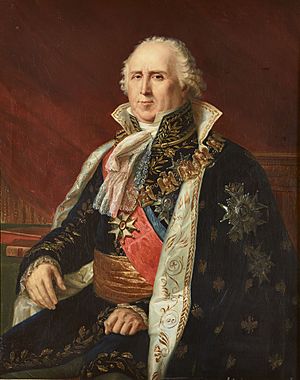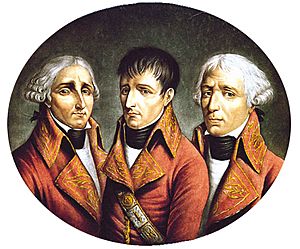Charles-François Lebrun facts for kids
Quick facts for kids
Charles-François Lebrun
Duc de Plaisance
|
|
|---|---|

Portrait by Robert Lefèvre, 1807
|
|
| Third Consul of France | |
| In office 12 December 1799 – 18 May 1804 Serving with Napoléon Bonaparte and Jean Jacques Régis de Cambacérès
|
|
| Preceded by | Roger Ducos (as Provisional Consul) |
| Succeeded by | Republic abolished |
| Member of the Council of Five Hundred | |
| In office 22 August 1795 – 9 November 1799 |
|
| Member of the National Constituent Assembly | |
| In office 9 July 1789 – 30 September 1791 |
|
| Member of the Estates General for the Third Estate | |
| In office 6 May 1789 – 6 June 1789 |
|
| Constituency | Dourdan |
| Personal details | |
| Born | 19 March 1739 Saint-Sauveur-Lendelin, Manche, Kingdom of France |
| Died | June 16, 1824 (aged 85) Sainte-Mesme, Yvelines, Kingdom of France |
| Resting place | Père Lachaise Cemetery |
| Spouse | Anne Delagoutte |
| Children | Anne-Charles Lebrun, 2nd duc de Plaisance Alexander Lebrun Sophie-Eugenie Lebrun Auguste-Charles Lebrun Dorothée Lebrun |
Charles-François Lebrun (born March 19, 1739 – died June 16, 1824) was an important French statesman. He served as the Third Consul of the French Republic. Later, Napoleon I made him an Arch-Treasurer and a Prince of the Empire. He played a key role in French politics during a very changing time.
Contents
Charles-François Lebrun: A French Statesman
Early Life and Career
Charles-François Lebrun was born in Saint-Sauveur-Lendelin, France. He studied philosophy at the Collège de Navarre in Paris. After his studies, he became a lawyer in Paris in 1762.
Becoming a Lawyer and Royal Censor
Lebrun started his career during the Ancien Régime, which was the old system of government in France. He held positions like censeur du Roi (a royal censor) in 1766. Later, he became an Inspector General for the Crown's lands in 1768.
Learning from Montesquieu and Travel
In the early 1760s, Lebrun became a follower of Montesquieu. Montesquieu was a famous thinker who admired the British Constitution. Lebrun traveled to the Netherlands and Great Britain to see how their governments worked. He even watched debates in the London Parliament.
He became a top advisor to Chancellor René Nicolas de Maupéou. Lebrun helped Maupéou in his struggles against the French courts, called parlements. When Maupéou lost power in 1774, Lebrun also stepped back from public life. He spent his time translating famous books like Jerusalem Delivered and the Iliad. He tried to live a simple life, inspired by the philosopher Jean-Jacques Rousseau.
Role in the French Revolution
When the French Revolution began in 1789, Lebrun understood its importance. He wrote a book called La voix du Citoyen where he predicted how events would unfold.
From Estates-General to National Assembly
Lebrun was a representative for the Third Estate in the Estates-General. This was a meeting of different groups in French society. He supported constitutional monarchy, meaning a king with limited power. He also suggested new financial laws.
After the 1791 Constitution was created, he could not be part of the new government. Instead, he became president of the local government in the Seine-et-Oise area.
Surviving the Reign of Terror
Lebrun left his position in August 1792 and went to live in Dourdan. Soon after, the storming of the Tuileries Palace happened. This event led to the creation of the French Republic.
During the Reign of Terror, a very dangerous time, Lebrun was arrested twice. He was almost sent to the guillotine, but he was saved. A relative helped him by hiding his legal papers. This delay allowed him to be saved by the Thermidorian Reaction, which ended the Reign of Terror.
In 1795, Lebrun was elected to the French Directory's Council of Ancients. Even though he supported the old royal family (the House of Bourbon), he voted against punishing those who had been part of the Jacobin group. He wanted to bring the country back together.
Serving Napoleon and Beyond
After Napoleon Bonaparte's coup in 1799, Lebrun became the Third Consul of France. In this role, he helped Napoleon reorganize France's money system and its local governments.
Third Consul and Arch-Treasurer
In 1803, he became a member of the Académie des Inscriptions et Belles-Lettres, a famous French academy. In 1804, he was named Arch-Treasurer of the French Empire by Napoleon.
Governor in Italy and the Netherlands
From 1805 to 1806, Lebrun was the governor-general of Liguria in Italy. During this time, Liguria became part of France. He did not agree with Napoleon bringing back the old French noble titles. In 1808, he reluctantly accepted the title of duc de Plaisance (Duke of Piacenza).
From 1811 to 1813, he served as governor-general of parts of the annexed Netherlands. He helped reorganize its local areas.
Later Years and Legacy
Lebrun did not fully agree with Napoleon's absolute rule. However, he did not support Napoleon being removed from power. When the Bourbon royal family returned in 1814, Lebrun accepted it. King Louis XVIII made him a Peer of France.
When Napoleon briefly returned to power during the Hundred Days, Lebrun accepted a new role from him. Because of this, he was suspended from the House of Peers when the Bourbons returned again in 1815. However, he was called back in 1819. Charles-François Lebrun died five years later in Sainte-Mesme in 1824.
Images for kids
See also
 In Spanish: Charles-François Lebrun para niños
In Spanish: Charles-François Lebrun para niños
 | James Van Der Zee |
 | Alma Thomas |
 | Ellis Wilson |
 | Margaret Taylor-Burroughs |





